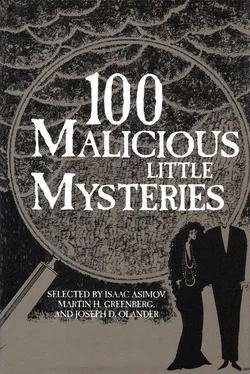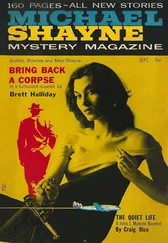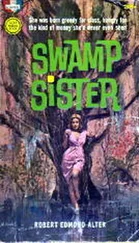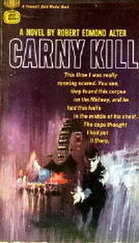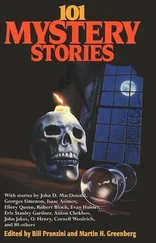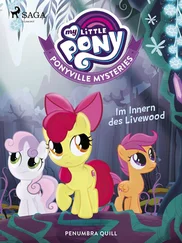Flammer looked from the porch at the pink hydrangea bush, still full-bloomed at summer’s end, and thought about how much he would enjoy holding Mrs. McVey’s earth-stained hand. Instead, he took a sip of her tea.
On September 19th Mrs. McVey was shot with a .32 revolver. The sound exploded in the night, and woke the neighbors on both sides of the McVey house.
It was some time before the neighbors heard the feeble cries for help that followed the report of the gun, and called the Haleyville police. Captain Flammer never quite forgave the officer on duty that night for not calling him at home when the shooting occurred. He had to wait until morning to learn that Mrs. McVey was dead.
No one on the scene saw anything more in Captain Flammer’s face than the concern of a conscientious policeman. He went about his job with all the necessary detachment. He questioned Mr. McVey and made no comment on his story.
“It was about two in the morning,” McVey said. “Grace woke up and said she thought she heard a noise downstairs. She was always hearing noises, so I told her to go back to sleep. Only she didn’t; she put on a kimono and went down to look for herself. She was right for a change — it was a burglar — and he must have got scared and shot her the minute he saw her... I came out when I heard the noise, and I saw him running away.”
“What did he look like?”
“Like two feet running,” Joe McVey said. “That was all I saw of him. But you can see what he was doing here.”
Flammer looked around — at the living-room debris, the opened drawers, the scattered contents, the flagrant evidence of burglary, so easy to create, or fabricate.
The physical investigation went forward promptly. House and grounds were searched, without result — no meaningful fingerprints or footprints were found, no weapon turned up — indeed, they found no clue of any kind to the murderous burglar of Arden Road. Then they searched for answers to other questions: Was there really a burglar at all? Or had Joe McVey killed his wife?
Captain Flammer conducted his calm inquiry into the case, and nobody knew of his tightened throat, of the painful constriction in his heart, of the hot moisture that burned behind his eyes.
But when he was through, he had discovered nothing to change the verdict at the coroner’s inquest: Death at the hands of person or persons unknown. He didn’t agree with that verdict, but he lacked an iota of proof to change it. He knew who the Unknown Person was; he saw his hateful, sour-mouthed face in his dreams.
Joe McVey disposed of the two-story house less than a month after his wife’s death — sold it at a bargain price to a couple with a grown daughter. Joe McVey then left Haleyville — went to Chicago, some said — and Captain Flammer no longer looked forward to spring, and the coming of the flowers, with joyful expectation.
But spring came again, resolutely as always, and despite the Captain’s mood of sorrow and resentment at his own inadequacy, his senses began to twitch. He began driving out into the countryside. And one day he stopped his car in front of the former McVey house.
The woman who stood on the porch, framed by clumps of blue hydrangea, lifted her arm and waved. If a heart can somersault, Flammer’s did. He almost said Grace’s name aloud, even after he realized that the woman was only a girl, plumpish, not yet twenty.
“Hello,” she said, looking at the police car in the driveway. “Beautiful day, isn’t it?”
“Yes,” Flammer said dully. “Are the Mitchells at home?”
“No, they’re out. I’m their daughter Angela.” She smiled uncertainly. “You’re not here on anything official, I hope?”
“No,” Flammer said.
“Of course, I know all about this house, about what happened here last year — the murder and everything.” She lowered her voice. “You never caught that burglar, did you?”
“No, we never did.”
“She must have been a very nice woman — Mrs. McVey, I mean. She certainly loved flowers, didn’t she? I don’t think I ever saw a garden as beautiful as this one.”
“Yes,” Captain Flammer said. “She loved flowers very much.”
Sadly, he touched a blue blossom on the hydrangea bush, and started back toward his car. He found that his eyes were filling up, and yet they had seen things clearly.
For suddenly he stopped and said, “Blue?”
The young woman watched him quizzically.
“Blue,” he said again, returning and staring at the flowering hydrangea bush. “It was pink last year — I know it was. And now it’s blue.”
“What are you talking about?”
“Hydrangea,” Flammer said. “Do you know about hydrangea?”
“I don’t know a thing about flowers. As long as they’re pretty—”
“They’re pretty when they’re pink,” Flammer said. “But when there’s alum in the soil — or iron — they come up blue. Blue like this.”
“But what’s the difference?” the girl said. “Pink or blue, what difference? So there’s iron in the soil—”
“Yes,” Captain Flammer said. “There must be iron in the soil. And now. Miss Mitchell, I’ll ask you to please fetch me a shovel.”
She looked bewildered, but then she got him the shovel. There was no triumph on Flammer’s face when he dug up the revolver at the base of the hydrangea bush, its barrel rusted, its trigger stiff.
He didn’t rejoice even when the gun had been identified, as both the weapon that had killed Grace McVey and as the property of Joe McVey. He didn’t rejoice when the killer had been brought back to face justice. But while he felt no sense of victory. Captain Flammer admitted one thing: there was a great deal of satisfaction to be derived from the love of flowers.
Trick or Treat
by Judith Garner
I was sitting with my American friend Bambi in our basement kitchen when the front doorbell rang. As the caretaker, I immediately rose to answer it, not for the first time cursing the necessity of taking on this job for the rent-free quarters.
It was October 30, and Mrs. Adams, my niggardly employer, had forbidden fires so early in the season. But already the chill and damp promised a fierce winter. I opened the street door to a grotesque little figure outlined against the yellow fog.
It was a small girl, about eight or nine years old, dressed as a witch in a long black university gown and pointed Welsh hat. She was not one of the tenants of our service flats, but I vaguely thought I had seen her playing in the Gardens with her Nanny and a pram. I had an idea she was an American, that her father had something to do with the Embassy. Not a pretty child, she had an old-fashioned rubber doll in a very dilapidated push-chair.
“Trick or treat?” she asked.
“Treat,” I said firmly, thinking I was being offered a choice.
She looked at me expectantly, but when I made no move, she inquired, “Well, where is it then?”
“What?”
“My treat,” she said patiently. “If you don’t give me a treat, I’ll play a trick on you.”
“You be off now,” I said crossly. “Why, it’s extortion! You Americans are all gangsters at heart!”
I closed the door in her hostile little face and went down to the basement, where Bambi was lighting yet another of her cigarettes.
“Trick or treat,” I explained.
“Oh!” she exclaimed. “I didn’t know you had that custom in England.”
“We don’t. What is it, American?”
“Yes, indeed. We always used to go out in costumes trick-or-treating in New York.”
“What kind of trick can I expect?”
“Well, my mother used to let us take a sockful of flour. If you hit it against the door it leaves a lovely mark.”
“I thought I heard some sort of thud as I came downstairs,” I said, “but it didn’t sound like a sockful of flour, more like a kick.”
Читать дальше
